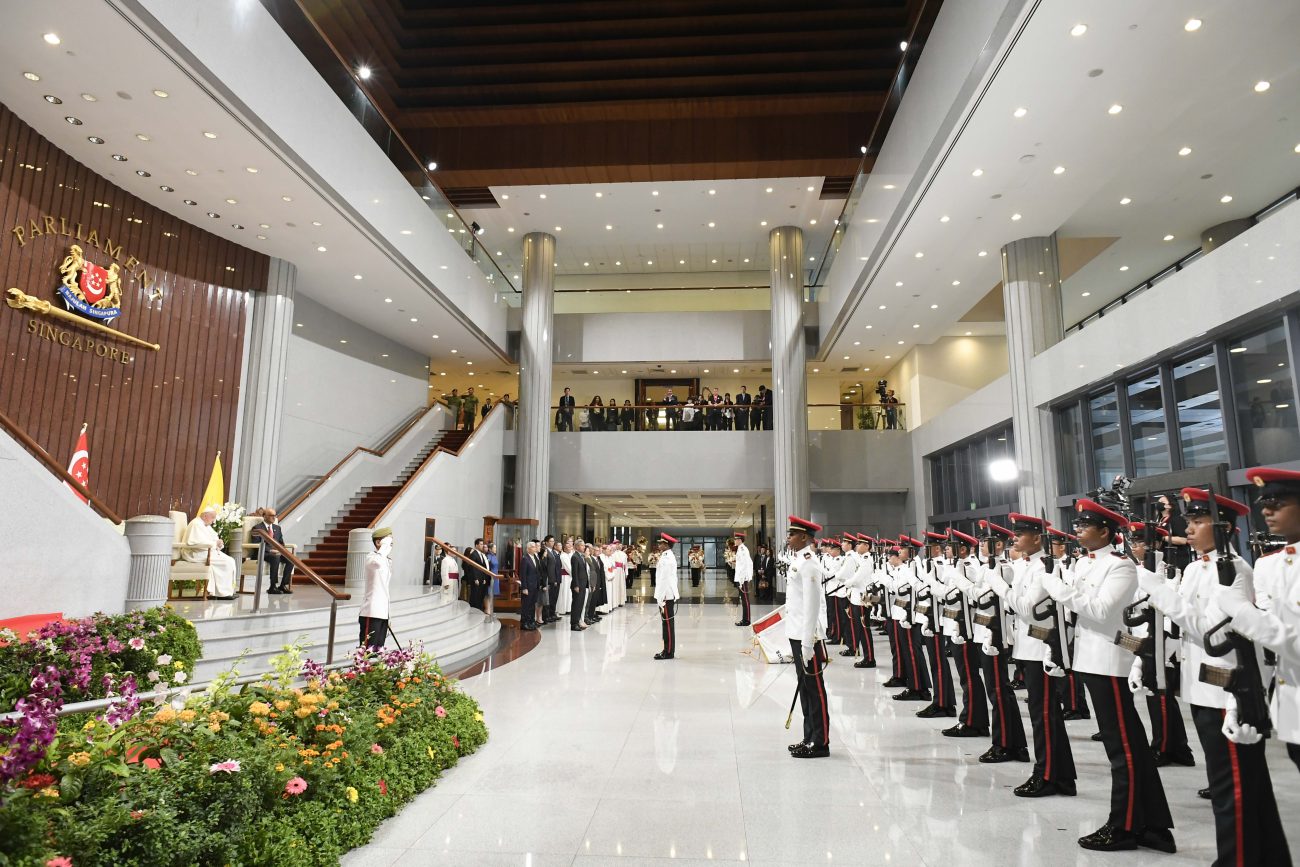SINGAPORE (CNS) — Pope Francis praised Singapore and its citizens for their hard work and ingenuity, but he urged them to be mindful of the poor and of the migrant workers who do much of the hard labor.
“I hope that special attention will be paid to the poor and the elderly — whose labors have laid the foundations for the Singapore we see today — as well as to protecting the dignity of migrant workers,” the pope told government and civic leaders Sept. 12. “These workers contribute a great deal to society and should be guaranteed a fair wage.”
More than 40% of Singapore’s workforce is made up of foreign workers, many of whom are migrant workers with a two-year work permit, which does not allow them to bring their families with them or to switch employers once they arrive in Singapore. The government also does not mandate a minimum wage for work-permit holders. They primarily work in construction, manufacturing, domestic service and in the shipyards.
Pope Francis had arrived in Singapore — often named as the world’s fourth wealthiest nation — from Timor-Leste, one of the world’s poorest countries.
Meeting the government and civic leaders in a theater at the National University of Singapore, he described the country as “a commercial crossroads of primary importance and a place where different peoples meet.” About 75% of the citizens have Chinese ancestry, but there also are large numbers of people of Malay or Indian descent.
Singapore “has not only prospered economically but has also striven to build a society in which social justice and the common good are held in high regard,” he said, pointing specifically to efforts to help citizens “through public housing policies, high quality education and an efficient healthcare system.”
“I hope that these efforts will continue until all Singaporeans are able to benefit from them fully,” the pope said. While the city-state is a modern seat of international finance, it does suffer from wealth inequality with about 25% of the population being considered poor.
Focusing “solely on pragmatism or placing merit above all things,” he said, runs the risk of excluding people on the margins of society from benefiting from progress.
Pope Francis also asked Singapore to use its technology, resources and regional influence to promote “better care of our common home.”
“Your search for innovative solutions to address environmental challenges can encourage other countries to do the same,” he said. “Singapore is a shining example of what humanity can achieve by working together in harmony, with a sense of responsibility and a spirit of inclusiveness and fraternity.”
In a country with Buddhists, Christians, Muslims, Taoists, Hindus, Jains, Zoroastrians, Jews, Sikhs and Baha’is, Pope Francis praised Singapore’s embrace of religious freedom and he asked the government “to continue to work in favor of the unity and fraternity of humanity and the common good of all peoples and all nations, in a way that does not exclude others or is restricted to your national interests.”
Singapore President Tharman Shanmugaratnam told Pope Francis, “We are a multiracial, multireligious and multicultural society. There was a time in our history when these realities gave rise to inter-communal tensions,” but through the efforts of the government and religious leaders, the people have come to value their diversity.
He also thanked the pope for being a “strong and principled advocate for human fraternity and environmental sustainability.”
PREVIOUS: Pope Lands in Singapore, Last Stage of his Asia-Pacific Trip
NEXT: Mind and Heart: Church Must Combat Mental Health Crisis, Sister Says




Share this story